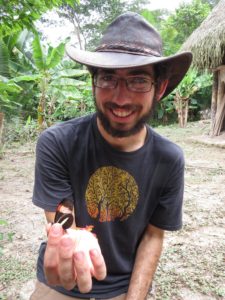Tuesday October 10th
07:30 PM
An Eggcellent Adventure: The eggs from (almost) every insect species you’ve ever heard of
MCZ 101, 26 Oxford Street, Harvard University
Sam Church, Seth Donoughe, and Bruno de Medeiros
Harvard University, Dept. of Organismic and Evolutionary Biology
advised by Dr. Cassandra Extavour

Insect eggs come in all shapes and sizes. The diversity of insect egg morphologies rivals the incredible morphological diversity of adult insects.
Open questions include: what is the range of insect egg sizes, and what are the causes and consequences of egg size evolution? In order to answer these questions, we have compiled a database of over 10,000 insect egg descriptions from the entomological literature.
To our surprise, the eggs of different insect species span a 100-million-fold range of volumes. We test long-standing hypotheses about how cell size, body size, and ecological factors shape the course of life-history evolution. Furthermore, we show that for any given adult size, egg volumes can range across four orders of magnitude. Our database can be used to test many additional hypotheses about life-history, insect development, and morphological evolution.
The talk is free and open to the public. The meeting is readily accessible via public transportation. Parking is available in the Oxford Street Garage with advance arrangement, as described here, or (usually but not always) at spaces on nearby streets. Everyone is also welcome to join us for dinner before the talk (beginning at 5:45 PM) at the Cambridge Common, 1667 Mass Ave., Cambridge.
CEC meetings are held the second Tuesday of the month from October through May. The evening schedule typically includes an informal dinner (5:45 to 7:15 PM) followed by our formal meeting (7:30 – 9:00 PM). The latter begins with club business and is followed by a 50 minute entomology related presentation. Membership is open to amateur and professional entomologists.



